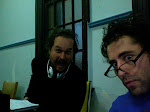Labeled as a “healing crusade,” Michael Rubenfeld’s The Book of Judith is one-fourth public service announcement, one-fourth choir-fueled, faux-Christian church service, and one-fourth personal exorcism — of Rubenfeld’s own inner difficulty in facing another individual’s disabilities head on. That leaves one fourth remaining, but we’ll get to that later.
Co-produced by director Sarah Stanley’s Die in Debt Theatre, Rubenfeld’s own Absit Omen Theatre and The Theatre Centre (almost next door neighbor to the Centre for Addiction and Mental Health on whose grounds the tent for this piece is pitched), the work centers on Rubenfeld’s experiences with Judith Snow, an advocate for the respect of those who live with disabilities and for their right to decide their own fates.
The missal that accompanies the show is full of Snow’s own wonderings about her life as a quadriplegic. Read from frequently, as if it’s scripture, her words of wisdom speak to those who would judge anyone based on their physical abilities alone. Set alongside the lyrics to the dozen or so songs composed for the play by Sunparlour Players’ frontman Andrew Penner (infused with his distinctive, half-moaning, half-mournful sound), this literal book of Judith is, then, the map to Rubenfeld’s redemption.
The tent-cum-temple suits the piece well, offering an intimate but well-illuminated environment. Matched with the sweet smells from the CAMH’s front gardens and the smoky scents wafting off the various candles lit around the space, the event feels immediate, which helps to make it inspiring.
What works most about The Book of Judith is the personal energy Rubenfeld gives it. It is really his story, and he is the one who is to be healed by it. As a whole, however, the performance is still strongly focused outwards, and while there are few moments of unearned intensity, the work never loses sight of its one very clear goal — to commune with its congregation.
The plot — if there is one — is perhaps too unbelievably unbelievable to hold much water, but the passion of Rubenfeld and the choir (itself comprised of 12 individuals of mixed physical abilities) drive the evening forward regardless. What seems to be absent, however, is the ever-building intensity required to usher in the reconciliation at the piece’s close.
And that’s where the missing one-fourth comes in. All shows need an audience to activate them, the The Book of Judith more so than most. It is a socially minded, soul-mending public spectacle of the stand-up-and-shout variety and, at the risk of sounding more of a cheerleader than critic, I encourage you to see this and to lend to its charming crusade your own energy. You never know: miracles happen every day.
BYRON LAVOILETTE, EYE WEEKLY







No comments:
Post a Comment